LinkedIn Research: The Future of Recruiting in UK
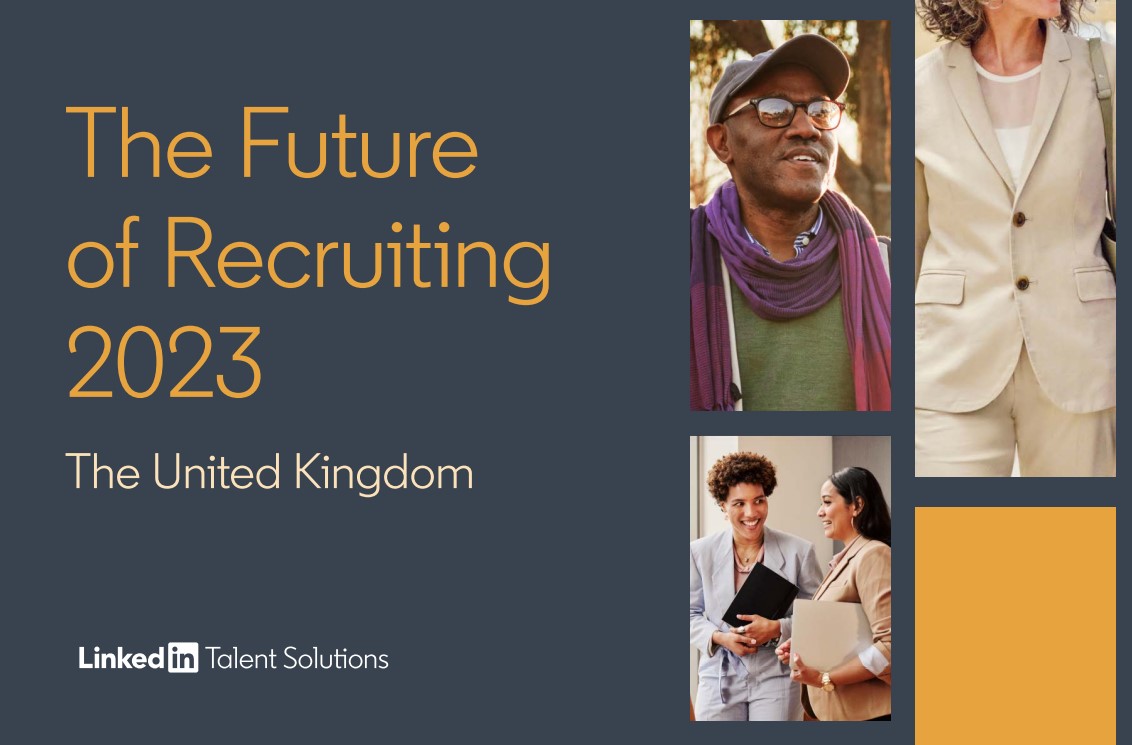
In the last few years, we had a lot of changes, for the uncertain economy and new trends reshaping the world of work.
This report offers 17 predictions based on interviews with global talent leaders, surveys of thousands of recruiting professionals, and analysis of millions of data points generated on LinkedIn.
LinkedIn Research surveyed 1,611 recruiting professionals in management seniority roles or higher (1,216 corporate recruiting professionals, 395 search and staffing professionals), in addition to 403 hiring managers.
As recruiter we need to be strategic, adaptable, and acutely in-tune with talent: what candidates want, what skills they possess, and how their careers can grow with your business.
Let’s see together 10 main predictions for 2023:
1 - Recruiting will be recognised for driving business-critical changes.
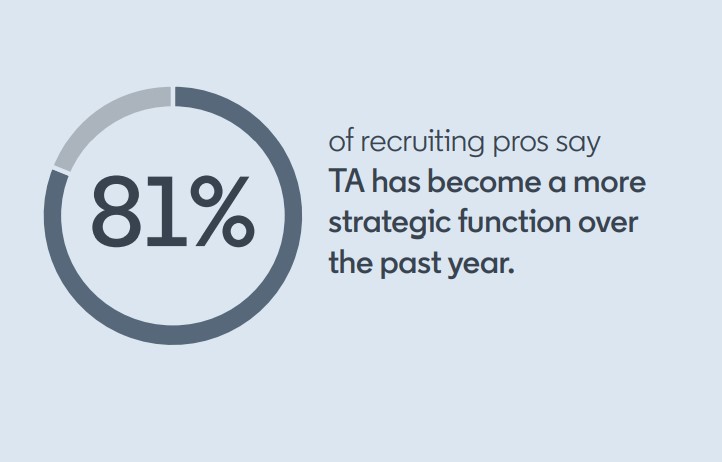
There’s no question that recruiting is becoming more strategic, and 65% of TA professionals say the team can claim a seat at the proverbial table. But now recruiting leaders “have the opportunity to actually change the seats at the table”, says Microsoft’s Brett Baumoel. “You’re going to truly change the table itself.”
2 - Recruiting will have more say over pay.
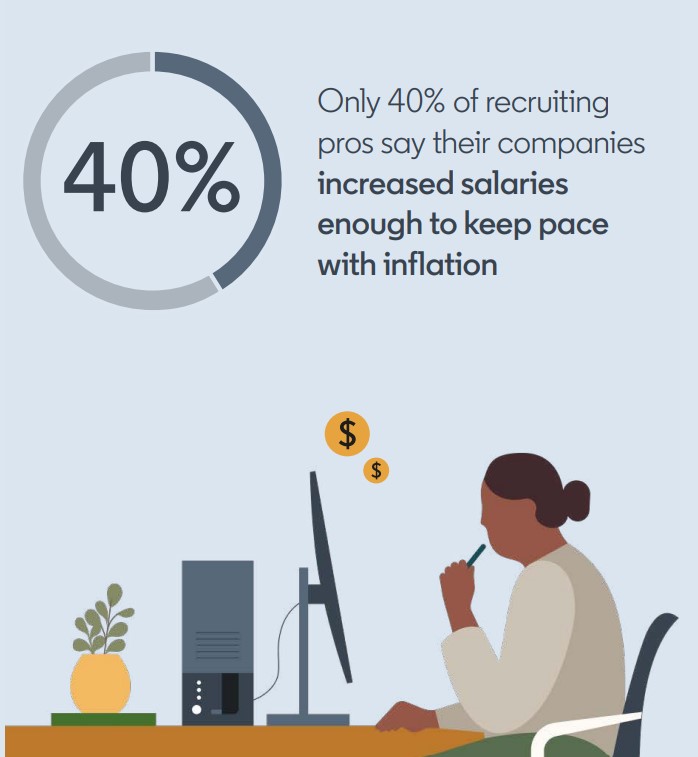
Recruiting leaders can help their companies stay ahead of the curve by raising this conversation today. As the leader with the clearest view of candidate priorities, labour market dynamics, and real-time recruiting performance at your company, you’re in the best position to lead the conversation about pay and its business impact – from championing comp models that favour skills over pedigree, to retaining your top talent by pushing for pay increases that keep pace with inflation.
3 - Recruiting will double down on employer branding as talent retains its leverage in the labour market.
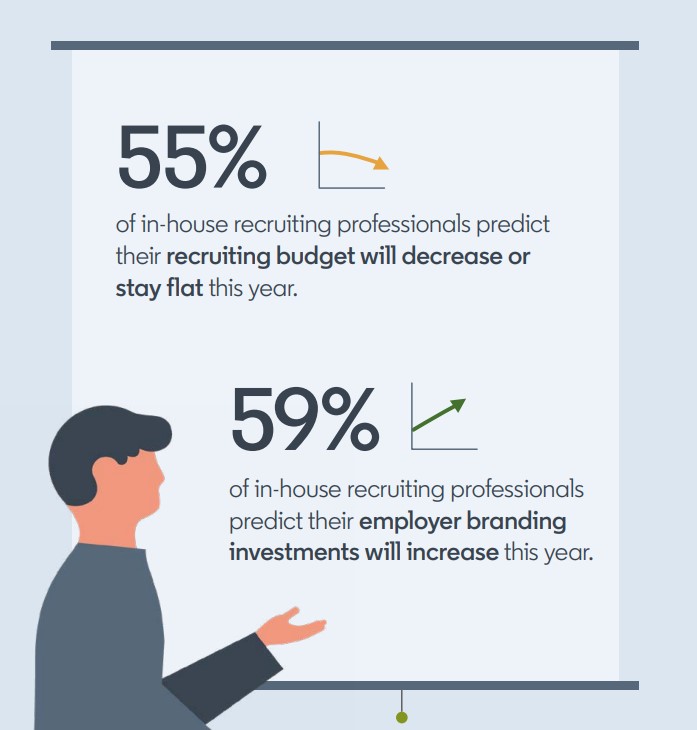
While less hiring typically means less power for workers, recruiting teams see that dynamic swinging back in the opposite direction over time: 61% predict that the future of recruiting will be more favourable to candidates and employees (as opposed to employers) over the next five years.
4 - Recruiters will need a more strategic set of soft skills.
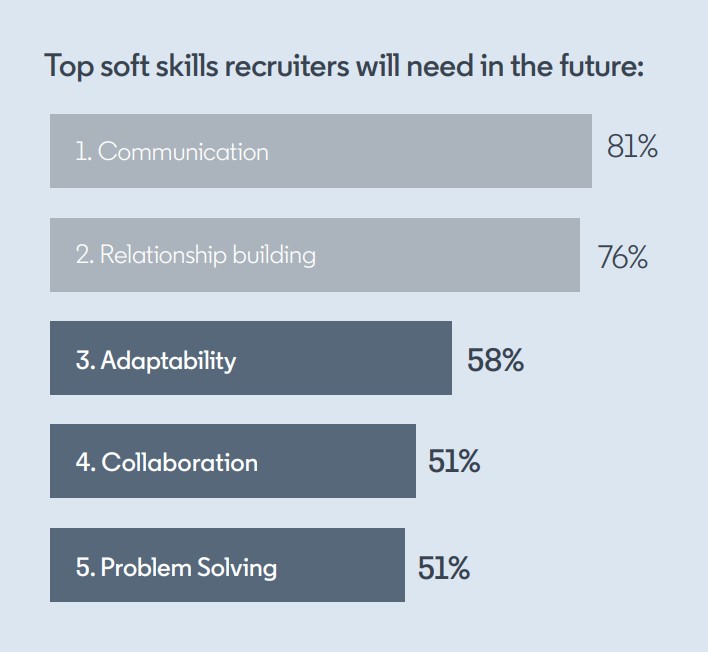
The skills companies need are changing fast. As LinkedIn’s CEO Ryan Rolansky likes to say, “Even if you aren’t changing your job, your job is most likely changing on you.” Adaptability, problem-solving, and communication rank among the top 5 soft skills recruiters will need in the future.
5 - Recruiting will collaborate more with learning and development.
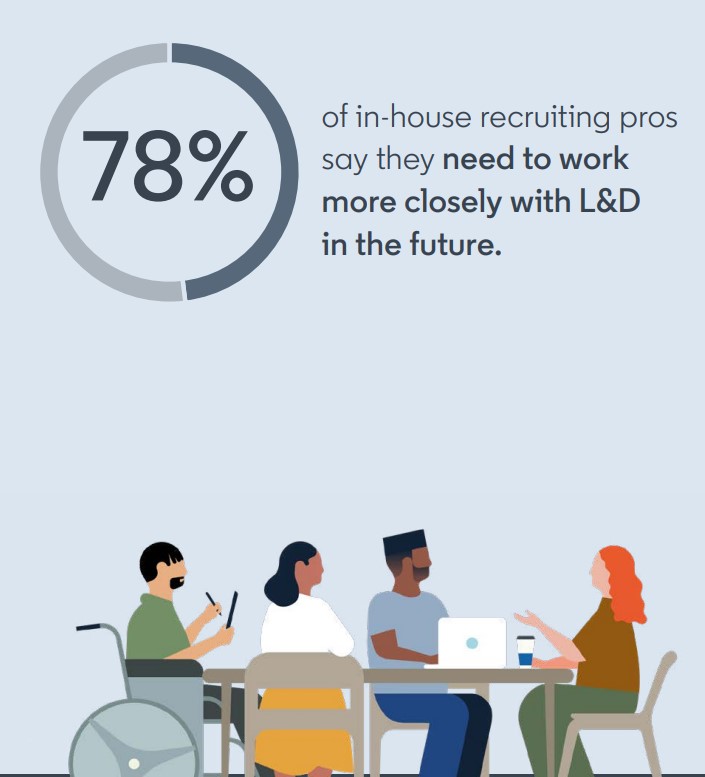
While nearly three-out-of-five (52%) of TA professionals say they’re already working closely with L&D, nearly four-out-of-five say they’ll need to grow even closer in the future. As recruiting leaders’ portfolios expand to include things like internal mobility, skills-first hiring, and employee retention, they’ll need to cooperate more with L&D to prepare internal talent for new roles, identify skill gaps, and ensure your company is a place people can grow their careers. You’ll hear the same from UK L&D professionals: 44% say they’re working more closely with TA this year, according to LinkedIn’s UK Workplace Learning Report for 2023.
6 - Generative AI will let recruiters focus on the human part of hiring.
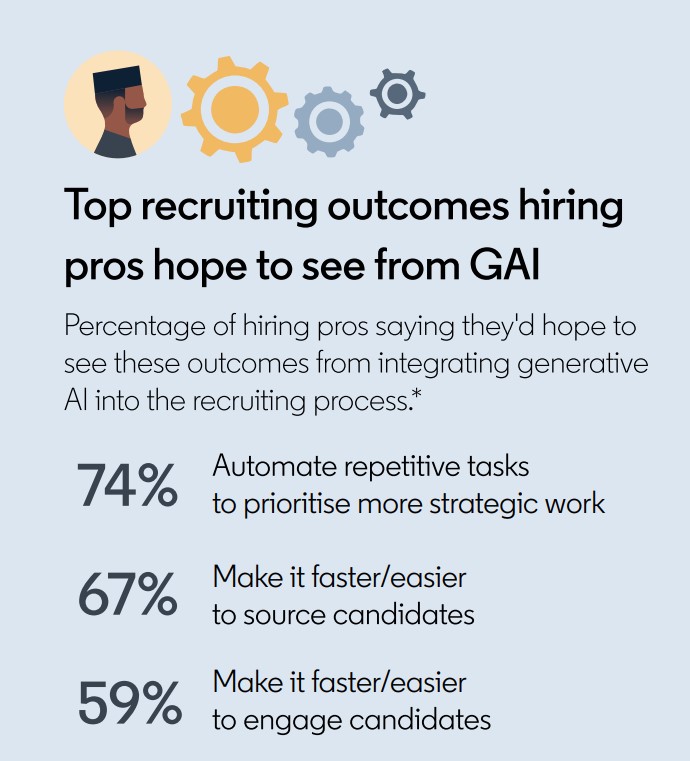
Generative AI (GAI) – i.e., tools like chatGPT that intelligently generate content – is a fascinating new technology that holds promise for talent professionals, many of whom believe it can help in time consuming tasks, like drafting job descriptions and personalised messages to candidates, among others. Hiring influencer Glen Cathey characterises himself as “cautiously exuberant”. He believes GAI can save a ton of time and let recruiters focus on the most human aspects of their jobs: listening to candidates, understanding their desires, and helping them find a new job they feel good about. While GAI may help draft content, it’s crucial to keep a “human in the loop” – someone with the right know-how should always be there to carefully review and fine-tune generated content. “You still need to keep your hands on the wheel,” Glen says, comparing the technology to self-driving cars. “We’re not at the stage where you can let go, and we’re certainly not at the stage where you can be asleep behind the wheel.”
7 - Companies will keep a closer eye on what candidates want most.
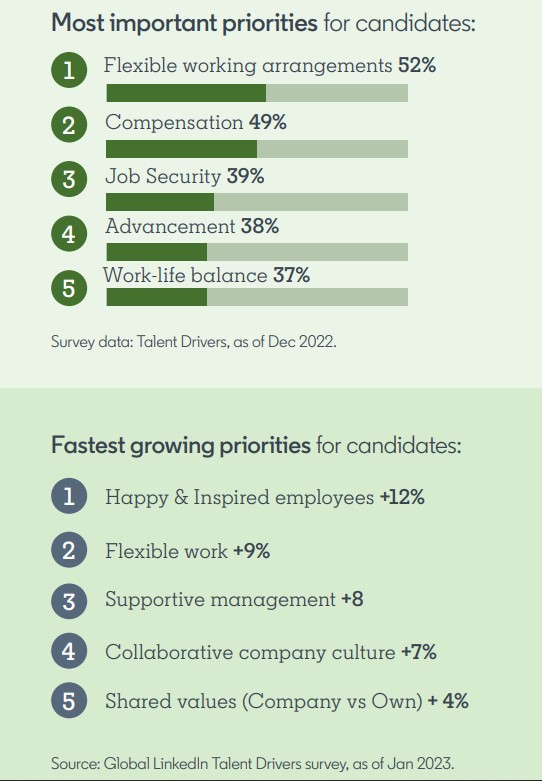
The labour market remains tight, and talent is expected to retain the upper hand over the next five years. To stay competitive, employers will have to re-examine their employer branding and make sure it aligns with what candidates are looking for today. The top priority for candidates today in the UK is flexible working arrangements and excellent compensation, by a fairly wide margin, followed by job security, professional advancement and work-life balance.
8 - Recruiting professionals will recalibrate their pitches to candidates.
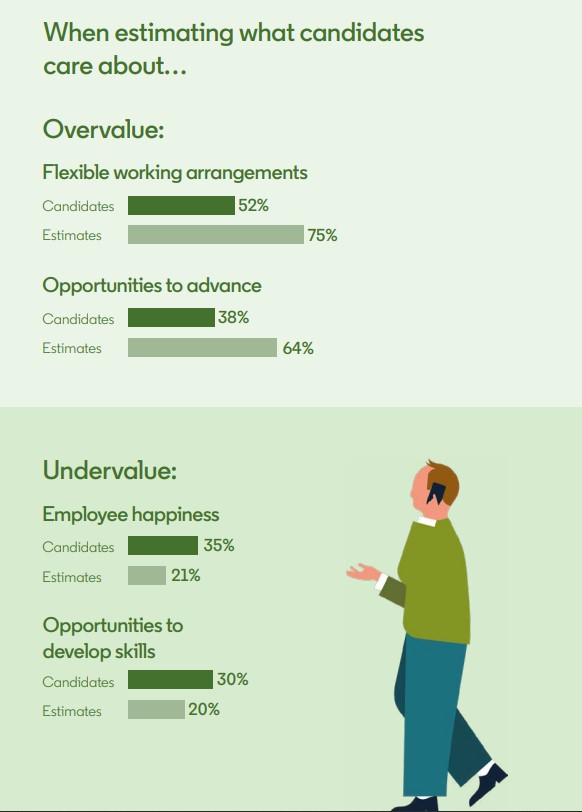
You learned what candidates want in an employer – but how does that compare to what employers think candidates want? Recruiting professionals tend to get tunnel vision on the most important priorities, to the detriment of other still-important factors. In reality, candidates’ preferences are more diffused and less top-heavy than a simple list might suggest. So instead of fixating on the particulars of your flexible work policy, hone in on the end result – happy and inspired employees – and don’t neglect other aspects of your company culture that foster happiness. Rather than only focusing on how people can advance within your org, show candidates how they can develop new skills to elevate their career, whether or not they choose to stay at your company.
9 - Business leaders will recognise the value of filling open roles with home-grown talent.
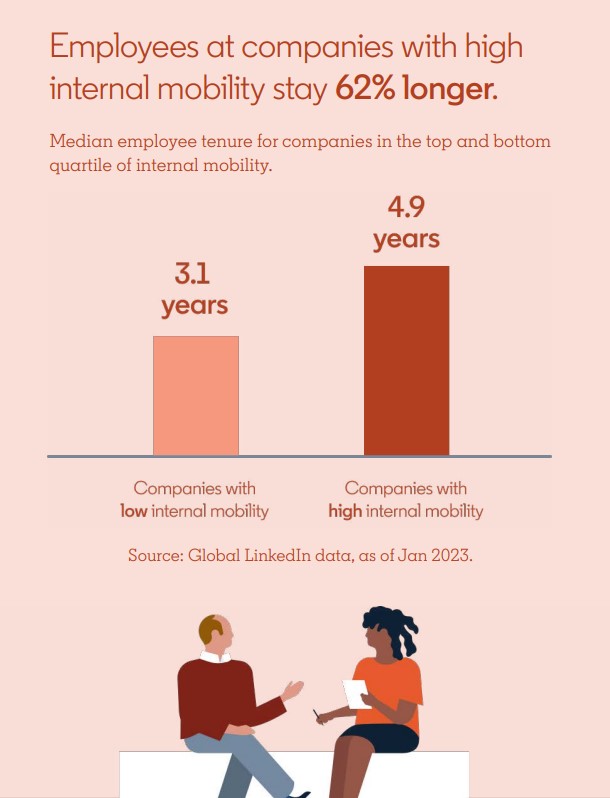
The shaky economy is forcing companies to look within more frequently when filling open positions: 76% of EMEA recruiting professionals say internal recruiting will be an important factor shaping the future of recruiting over the next 5 years. Internal mobility provides big payoffs, starting with higher employee retention. LinkedIn data shows that employees stay at companies almost 2x longer if the employer is highly committed to internal hiring.
10 - Upskilling will be a key tool for retaining a diverse workforce.
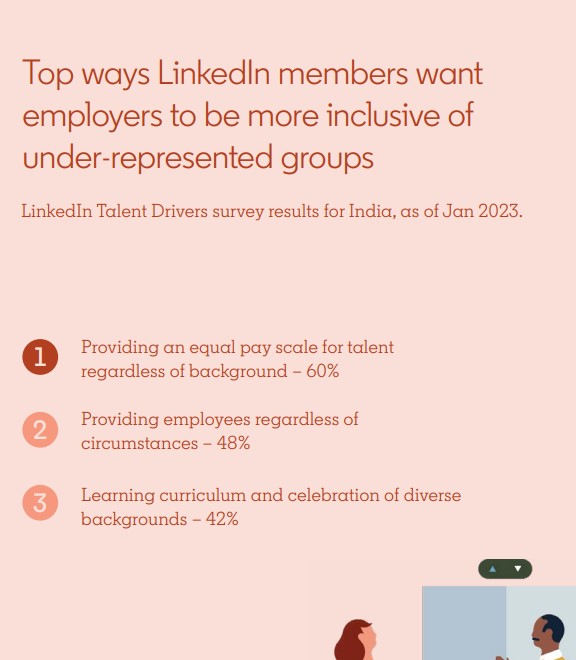
With companies facing serious skills gaps, it’s no wonder 74% of UK recruiting professionals say upskilling and reskilling employees will be an important factor shaping the future of recruiting over the next 5 years. But there’s another reason why L&D is gaining more attention: employers understand that offering learning opportunities will be critical to advancing diversity and inclusion.
SEE FULL REPORT HERE